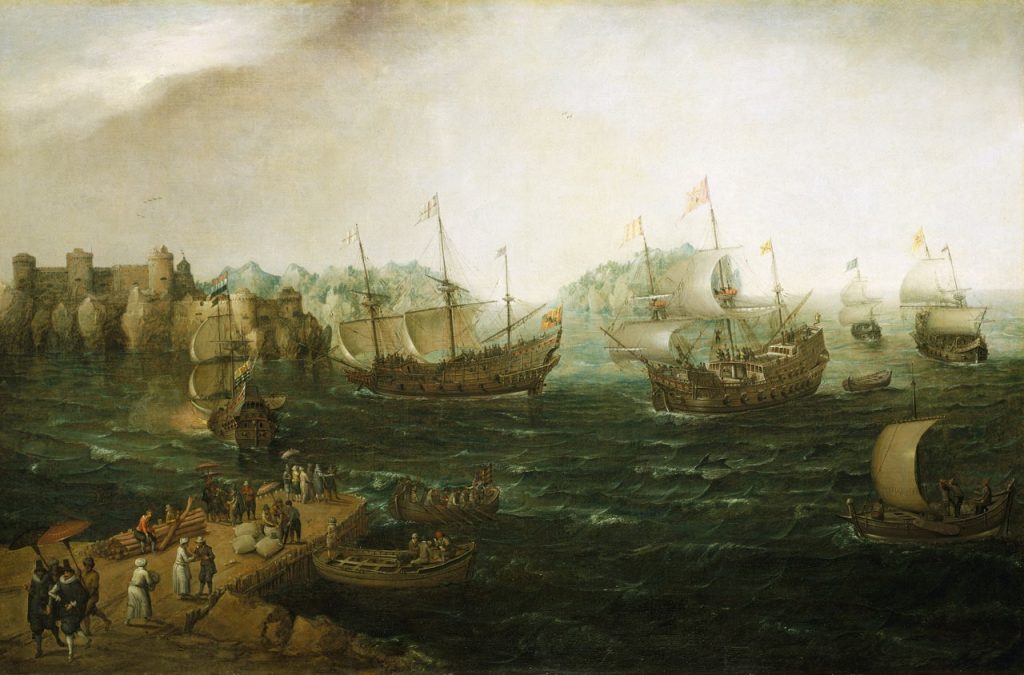Contents
Contents
The Navigation Acts were a series of laws that regulated foreign trade across the British Empire during the 17th and 18th centuries.
In this guide, we’ve explained what the Navigation Acts did, and how they contributed to increased resentment between the British and American colonists.
Summary
In the early history of the British Empire, the British government believed in mercantilism.
Mercantilism was a nationalist school of economic theory that promoted trade protectionism, and discouraged the importation of foreign goods, in order to keep wealth inside the country. It emphasized maximizing exports and minimizing imports as much as possible.
To promote mercantilism throughout the 1600s and 1700s, the British used a series of laws called the Navigation Acts.
The first Navigation Act was implemented in 1651, before being broadened in 1660, and updated in 1663, 1673, and again in 1696.
The acts restricted trade with other nations, defined customs regulations, and ensured that trading occurred through British ports as much as possible, especially “enumerated commodities” (specific important goods) such as tobacco that the British wanted to control.
Under the Navigation Acts, ships exporting goods had to be British-owned, and also had to have majority British crews.
Effects on the Thirteen Colonies

For the Thirteen Colonies, the Navigation Acts officially prevented them from trading goods such as sugar and tobacco with other foreign countries.
Shipments had to go through England first, and be taxed by the British, before they could be imported or exported, massively increasing the cost of buying and selling.
Fortunately for the colonists, enforcement of the Navigation Acts was lenient throughout most of the 1600s, under a British government policy known as salutary neglect – meaning that the colonies could largely do as they pleased.
Trade regulations were not strongly enforced, which led colonial merchants to begin illegally trading goods with countries such as Holland and Spain, and French territories in the Caribbean.
However, beginning in the mid-1700s, the British ended their unofficial policy of salutary neglect.
After the French and Indian War (1754-1763), the British were in a huge amount of debt, and maintaining the British Army’s presence in the colonies was expensive.
Under the leadership of Prime Minister George Grenville, the British decided to use their colonies to raise revenue, by encouraging trading with British merchants, and preventing smuggling, meaning more goods would be subject to British taxes.
Greater enforcement of the Navigation Acts, along with the introduction of new measures designed to increase taxation revenue, such as the Sugar Act (1764), led to resentment from colonial merchants. Customs officials no longer turned a blind eye to smuggling, and it became much more difficult to sell certain goods for a profit in foreign markets. New taxes were also placed on merchants importing or exporting goods such as molasses, putting even more pressure on profit margins.
The British then continued placing greater restrictions on colonial merchants to try and raise revenue and prevent smuggling, through laws such as the Townshend Acts (1767-68), and the Tea Act (1773).
After more than a century of salutary neglect, these new restrictions, along with the enforcement of the Navigation Acts, came as a shock to the system for the colonists. The new indirect taxes were particularly difficult to accept for colonial merchants, as many believed that the British had no right to tax the colonies without the people’s consent.
In addition, under the rules of the 1696 Navigation Act, people accused of smuggling could be tried in British Admiralty Courts, rather than by a colonial jury. This increased the chances of a conviction, and took autonomy away from colonial governments, who saw jury trials as a fundamental right.
These laws led to widespread boycotts of British goods in the leadup to the Revolutionary War and contributed to a growing resentment of the British, especially among merchants. This tension also spread to wider society at large, thanks to laws such as the Stamp Act and Coercive Acts, eventually leading to the American Revolution.
The Navigation Acts themselves were not a huge contributing factor towards the Revolutionary War. However, their sudden enforcement, which came along with other taxes and restrictions, and a tightening of customs rules, contributed to growing resentment towards the British government from 1764 onwards, which eventually led to the American Revolution.
Facts
- The Navigation Acts were officially known as the Acts of Trade and Navigation.
- The Navigation Acts were finally repealed in 1849, as Britain moved on from mercantilism to a philosophy of free trade.
- The Navigation Acts, especially the 1651 Act, were primarily designed to help the British compete against the Dutch – their major rivals in global trade at the time. This led to open conflict between the two countries, beginning with the First Anglo-Dutch War of 1652-1654.
- One of the collateral benefits of the Acts for Britain was the promotion of domestic shipbuilding. The requirement that all goods be carried in English or colonial ships led to a boom in shipbuilding in both England and the American colonies, particularly in New England, which became a center for shipbuilding in North America.
- By restricting trade to British ships, The Navigation Acts inadvertently encouraged piracy. Many privateers, initially licensed by Britain during wars to seize enemy vessels, turned to piracy in peacetime, targeting lucrative British goods that were made more expensive by the restrictions put in place.

